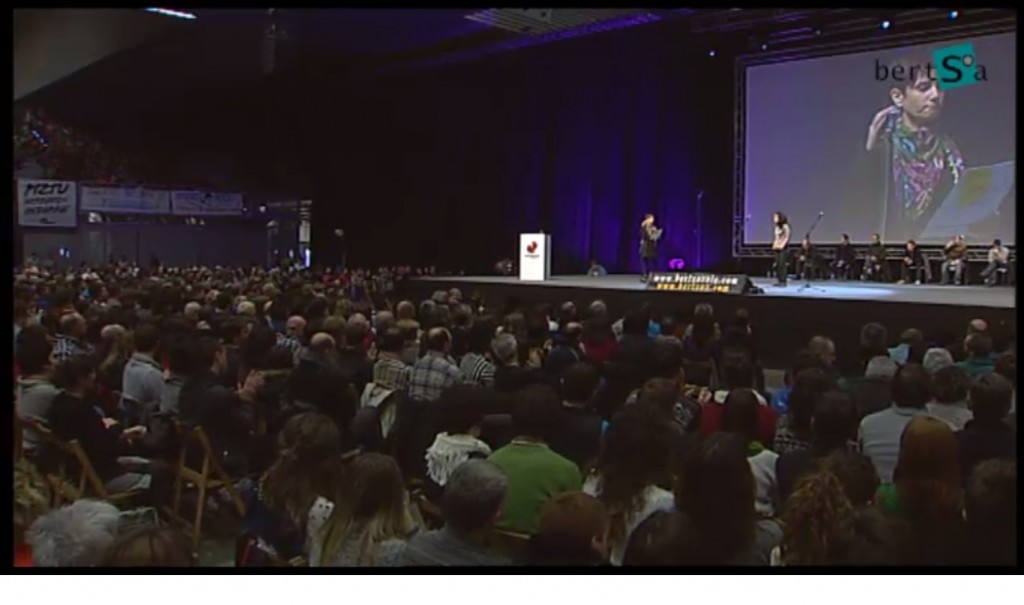“El perdón no borra el amargo pasado. Una memoria sanada no es una memoria eliminada. Todo lo contrario, perdonando aquello que no podemos olvidar crea una nueva forma de recuerdo. Transformamos la memoria de nuestro pasado en esperanza para nuestro futuro”
(Lewis B. Smedes, The Art of Forgiving, 1996)
La memoria es fundamental para todo lo que hacemos o deseamos hacer. De hecho, mucho de lo que somos como individuos o comunidades se debe a la memoria. ¿Nos podríamos imaginar sin memoria? Nos encontraríamos sin pasado, sin identidad. Historia y memoria colectiva son una parte inseparable de cualquier cultura. ¿Cómo puede la tecnología ayudarnos a recopilar, preservar y hacer accesible al público nuestra memoria, nuestra identidad, historia y pasado? En este sentido, son varias las iniciativas llevadas a cabo a lo largo del año en el trabajo de recuperación y visibilización de la memoria histórica y social de Euskal Herria en el que la tecnología se ha convertido en un instrumento indispensable. Coincidiendo con el centenario del nacimiento de Jon Bilbao Azkarreta, el Instituto Vasco Etxepare y la Universidad de Nevada, Reno crearon la Cátedra Jon Bilbao, dando inicio al proyecto de investigación “Memoria Bizia: Patrimonio Vivo de la Diáspora Vasca” con el apoyo de la federación de asociaciones vascas de Norte América (NABO), el Gobierno Vasco y la Universidad de Deusto.
 Mientras “Memoria Bizia” se centra en los testimonios orales de vascos y descendientes vascos, de más edad, residentes en Estados Unidos y Canadá, el proyecto “Ondare Bizia: Exilio, Emigración y Retorno Vascos” trabaja en los testimonios de la última generación de exiliados, emigrantes y retornados de origen vasco a Euskal Herria. Liderado por los institutos de Estudios Vascos y de Derechos Humanos de la Universidad de Deusto, el proyecto se constituye en la plataforma multimedia online de divulgación y reflexión sobre dicho fenómeno social, “OndareBizia.deusto.es” y que toma vida en el documental “Ahaztutako Garaiak – Tiempos Olvidados” donde se muestra la diversidad y complejidad del pasado y del presente de la migración y del retorno a Euskal Herria, a partir de los testimonios de 24 personas.
Mientras “Memoria Bizia” se centra en los testimonios orales de vascos y descendientes vascos, de más edad, residentes en Estados Unidos y Canadá, el proyecto “Ondare Bizia: Exilio, Emigración y Retorno Vascos” trabaja en los testimonios de la última generación de exiliados, emigrantes y retornados de origen vasco a Euskal Herria. Liderado por los institutos de Estudios Vascos y de Derechos Humanos de la Universidad de Deusto, el proyecto se constituye en la plataforma multimedia online de divulgación y reflexión sobre dicho fenómeno social, “OndareBizia.deusto.es” y que toma vida en el documental “Ahaztutako Garaiak – Tiempos Olvidados” donde se muestra la diversidad y complejidad del pasado y del presente de la migración y del retorno a Euskal Herria, a partir de los testimonios de 24 personas.
 Nuestro objetivo parafraseando al Profesor Yehuda Elkana, superviviente del Holocausto, no es perpetuar la memoria colectiva de nuestro pasado más inmediato para que acabe rigiendo el presente y altere así el destino de nuestras vidas, sino que es en ella donde se encuentra la semilla de la esperanza en el futuro. Las historias orales recuperadas hasta la fecha nos presentan una memoria viva, una memoria moral, que supone una deslegitimización ética y social de actitudes de un pasado silenciado y construido sobre injusticias no reparadas. Sobre todo, estos testimonios, muchas veces sobrecogedores, nos aleccionan sobre el perdón para con sus victimarios y nos adentran en paisajes de memorias de otros tiempos que discurren entre olvidos y recuerdos.
Nuestro objetivo parafraseando al Profesor Yehuda Elkana, superviviente del Holocausto, no es perpetuar la memoria colectiva de nuestro pasado más inmediato para que acabe rigiendo el presente y altere así el destino de nuestras vidas, sino que es en ella donde se encuentra la semilla de la esperanza en el futuro. Las historias orales recuperadas hasta la fecha nos presentan una memoria viva, una memoria moral, que supone una deslegitimización ética y social de actitudes de un pasado silenciado y construido sobre injusticias no reparadas. Sobre todo, estos testimonios, muchas veces sobrecogedores, nos aleccionan sobre el perdón para con sus victimarios y nos adentran en paisajes de memorias de otros tiempos que discurren entre olvidos y recuerdos.
“Ahaztutako Garaiak – Tiempos Olvidados” (Universidad de Deusto, 2014).
¿Cuál ha sido ese momento de 2014 que atesoras en la memoria? Cuéntanoslo.
Jai Zoriontsuak eta Urte Berri On!!!


